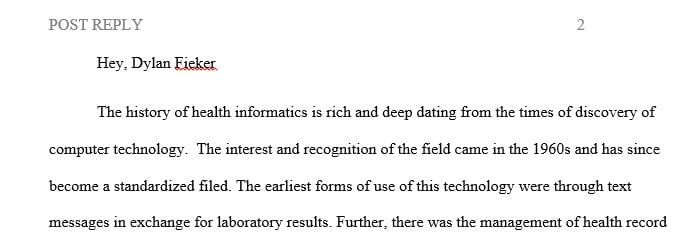Nelson and Staggers defined Health Informatics as an interdisciplinary professional specialty and scientific discipline
Health Care Informatics – Module 1 Discussion
Dr. Latasha Easterling
BUSI 505
Dylan Fieker
The Evolution Of Health Informatics
Nelson and Staggers defined Health Informatics as an interdisciplinary professional specialty and scientific discipline that integrates the health sciences, computer science, and information science, as well as a number of other analytic sciences, with the goal of managing and communicating data, information, knowledge, and wisdom in the provision of healthcare for individuals, families, groups, and communities (Nelson & Staggers, 2018, p. 2). Health Care Informatics is a relatively knew specialty in the Health Care realm. As proof of this discipline constantly evolving and growing, there are new subspecialties inside health informatics such as Cheminformatics and Dental Informatics (Kampov-Polevoi J, & Hemminger BM, 2010). The development of informatics in the healthcare realm can allow easy and accurate access to health record information from everything from immunization history to major surgical history.
Professional Organizations
Nelson and Staggers reference several professional organizations that oversee and continuously improve the specialty of health informatics. These are The American Health Information Management Association (AHIMA), Healthcare Information and Management Systems Society (HIMSS), the American Association of Colleges of Nursing (AACN), and the American Medical Informatics Association (AMIA) (Nelson & Staggers, 2018, p. 2). The importance of these professional organizations is seen in development, maintenance of health informatics systems, and education. For example, the American Association of Colleges of Nursing released a group of documents which they titled the Essential Series. These documents set a new standard of education on health informatics for all nursing students. These requirements are mandatory for all nursing students, regardless of the degree they are seeking (ASN, BSN, MNP, or DNP). These new requirements will prepare nursing students to be able to be able to proficiently use health informatics systems. Not only will this new education help nurses seamlessly enter the workforce, it will also improve their daily nursing practice in documentation, medication handling, and sensitive personal identifiable information (PII). In doing this, the American Association of Colleges of Nursing has mandated that health informatics becomes a main learning point of all the educational programs they are associated with.
Nelson and Staggers explain that one of the main reasons it seems that health informatics becoming more prevalent has been a slow process is because of the advanced age of most physicians and medical school faculty. For this reason, the nursing field became one of the earliest healthcare fields to start the change to educating medical professionals in using this new technology. In 1992, the American Nurses Association (ANA) recognized nursing informatics as a nursing specialty (Nelson & Staggers, 2018, p. 500). This step launched the release of education documents aimed at proficiency in health informatics. By the American Nurses Association having the initiative to take steps forward in education requirements, other medical graduate education organizations have started the process in developing standards and curriculum for those attending medical schools. As of the writing of our text, the American Medical Informatics Association (AMIA) Academic Forum and the Health Information Accreditation Committee are working to create curriculum and guidelines to mitigate deficiencies that have been shown by medical professionals (Nelson & Staggers, 2018, p. 500). These efforts to initiate inclusion of health informatics will be applied to all levels of medical education, as well as the continuing education that is required of all practicing medical professionals.
Conclusion
Health informatics is an ever-evolving specialty. The efforts of professional programs to include informatics in education curriculums will make our healthcare system more proficient and communication of health data streamlined. The effects of being competent in health informatics will be shown in all aspects of the healthcare field. However, the most important effect and perhaps what the focus should be on primarily is quality of care. As healthcare professionals it is of the utmost importance to treat each patient as an individual and not just a number. It is a difficult task at times, but each patient should be treated with the quality of care that we would want our family to have. The increased accuracy, security, and expanded communication brought by health informatics will create a higher standard of care, and greatly reduce incidents that harm quality of care. The Bible has something to say when it comes to giving our best to treat each patient like family, and work as hard as possible in every situation. It may be hard for us to see each patient as family, but it is easy to see where our motivation for striving to be better in our jobs should come from. Colossians 3:23 says “Whatever you do, do your work heartily, as for the Lord rather than for men”. This verse should help us realize that we are representatives of Christ in everything we do, and even when it gets stressful and difficult, as the healthcare field often does, we should work heartily for the Lord.
References
Nelson, R., & Staggers, N. (2018). Health informatics: An interprofessional approach(2nd ed.). St. Louis, MO: Elsevier. ISBN: 9780323402316.
Colossians 3:23 NASB – – Bible Gateway. (n.d.). Www.Biblegateway.Com. Retrieved August 28, 2020, fromhttps://www.biblegateway.com/passage/?search=colossians+3%3A23&version=NASB
Glaser, J. (2007). the competitive value of healthcare IT. Hfm (Healthcare Financial Management), 61(7), 36–40.
Kampov-Polevoi J, & Hemminger BM. (2010). Survey of biomedical and health care informatics programs in the United States. Journal of the Medical Library Association, 98(2), 178–181. https://doi-org.ezproxy.liberty.edu/10.3163/1536-5050.98.2.014
Answer preview to Nelson and Staggers defined Health Informatics as an interdisciplinary professional specialty and scientific discipline 
APA
512 words



